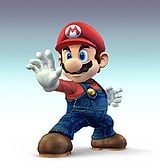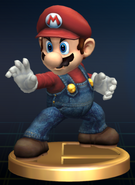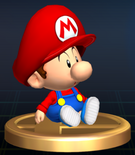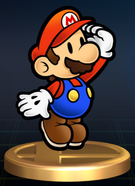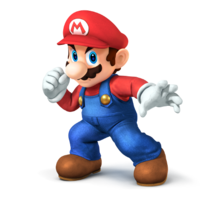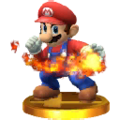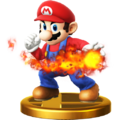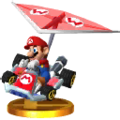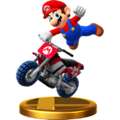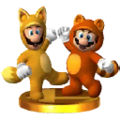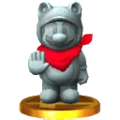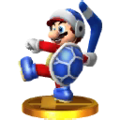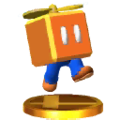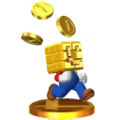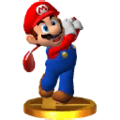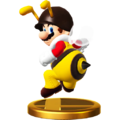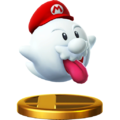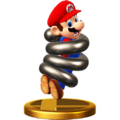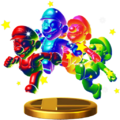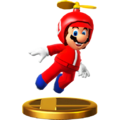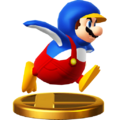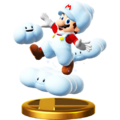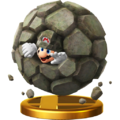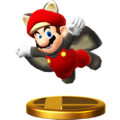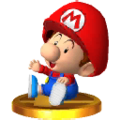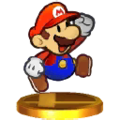Mario: Difference between revisions
| Line 30: | Line 30: | ||
Miyamoto's next game was the world-famous ''[[Super Mario Bros.]]'' for the Famicom/NES, the game that single-handedly brought video gaming into the mainstream and made Nintendo a major company in a now-major industry [http://www.g4tv.com/top-100/478/super-mario-bros/]. Many iconic aspects of Mario and his franchise were established: Mario and Luigi now live in the magical [[Mushroom Kingdom]] ruled under Princess "[[Peach]]" Toadstool and her mushroom-retaining [[Toad]] servants, and the Koopa king [[Bowser]] kidnaps the princess for Mario to rescue. Mario must bound across side-scrolling platform stages to rescue her, jumping on the heads of common enemies like [[Goomba]]s and [[Koopa Troopa]]s to defeat them. He starts out small but can grow to [[supermariowiki:Super Mario|double his size]] if he grabs a [[Super Mushroom]] power-up, gain the ability to [[supermariowiki:Fire Mario|shoot out fireballs]] by grabbing a [[Fire Flower]], and [[supermariowiki:Invincible Mario|turn invincible]] for a short period of time by grabbing a [[Super Star]]. ''Super Mario Bros.'' became a franchise with these elements lasered into video game iconography, consistent in future games in the ''Mario'' series. | Miyamoto's next game was the world-famous ''[[Super Mario Bros.]]'' for the Famicom/NES, the game that single-handedly brought video gaming into the mainstream and made Nintendo a major company in a now-major industry [http://www.g4tv.com/top-100/478/super-mario-bros/]. Many iconic aspects of Mario and his franchise were established: Mario and Luigi now live in the magical [[Mushroom Kingdom]] ruled under Princess "[[Peach]]" Toadstool and her mushroom-retaining [[Toad]] servants, and the Koopa king [[Bowser]] kidnaps the princess for Mario to rescue. Mario must bound across side-scrolling platform stages to rescue her, jumping on the heads of common enemies like [[Goomba]]s and [[Koopa Troopa]]s to defeat them. He starts out small but can grow to [[supermariowiki:Super Mario|double his size]] if he grabs a [[Super Mushroom]] power-up, gain the ability to [[supermariowiki:Fire Mario|shoot out fireballs]] by grabbing a [[Fire Flower]], and [[supermariowiki:Invincible Mario|turn invincible]] for a short period of time by grabbing a [[Super Star]]. ''Super Mario Bros.'' became a franchise with these elements lasered into video game iconography, consistent in future games in the ''Mario'' series. | ||
For over 20 years afterward, Mario would star in many games for various Nintendo systems. Mario and his accompanying franchise can be viewed as Nintendo's thematic tileset with which to create games of a whimsical, colorful, and light-hearted nature. Mario himself is meant to be a character anyone can enjoy playing as, and can fit well as a protagonist figure and/or main balanced character in many genres of games. To this end, he is not portrayed as a character that undergoes development like what players would see with a character in an epic RPG's story. He is, in fact, rarely (but occasionally) depicted speaking coherent English sentences. In contemporary ''Mario'' games, Mario's high-pitched Italian voice, provided by Charles Martinet, is used mainly for grunts and yells and the occasional catchphrase, such as "Mama-mia!", "It's-a me, Mario!", "Let's-a-go!", although he is shown to speak at length in some spin-off games and official interviews. As a semi-silent, optimistic protagonist, Mario is inherently easy for players of his various games to appreciate, and he is usually the most balanced selectable character in any game he appears in, including the [[Super Smash Bros. (series)|''Smash Bros.'' games]]. While Mario's definitive, Martinet-voiced depiction was codified by ''Super Mario 64'', most media prior to that game (such as the [[supermariowiki:Super Mario Bros. (film)|live-action film]] and various cartoons) provided different portrayals of the iconic plumber, typically as a mild caricature of a working-class Italian-American with a gruff Brooklyn accent. | For over 20 years afterward, Mario would star in many games for various Nintendo systems. Mario and his accompanying franchise can be viewed as Nintendo's thematic tileset with which to create games of a whimsical, colorful, and light-hearted nature. Mario himself is meant to be a character anyone can enjoy playing as, and can fit well as a protagonist figure and/or main balanced character in many genres of games. To this end, he is not portrayed as a character that undergoes development like what players would see with a character in an epic RPG's story. He is, in fact, rarely (but occasionally) depicted speaking coherent English sentences. In contemporary ''Mario'' games, Mario's high-pitched Italian voice, provided by Charles Martinet, is used mainly for grunts and yells and the occasional catchphrase, such as "Mama-mia!", "It's-a me, Mario!", "Let's-a-go!", although he is shown to speak at length in some spin-off games and official interviews. As a semi-silent, optimistic protagonist, Mario is inherently easy for players of his various games to appreciate, and he is usually the most balanced selectable character in any game he appears in, including the [[Super Smash Bros. (series)|''Smash Bros.'' games]]. While Mario's definitive, Martinet-voiced depiction was codified by ''Super Mario 64'', most auxiliary media prior to that game (such as the [[supermariowiki:Super Mario Bros. (film)|live-action film]] and various cartoons) provided different portrayals of the iconic plumber, typically as a mild caricature of a working-class Italian-American with a gruff Brooklyn accent. | ||
Genres of games in which Mario appears in a playable role include the traditional 2D side-scrolling platformer, including various sequels to ''Super Mario Bros.'', the famed Super NES launch platformer ''[[Super Mario World]]'', which introduced [[Yoshi]] as a mount of sorts for Mario, and the DS homage to these games in the form of ''{{IW|mariowiki|New Super Mario Bros.}}''; 3D platforming adventures such as the seminal ''[[Super Mario 64]]'' adventure game launched for the [[Nintendo 64]], followed up by ''[[Super Mario Sunshine]]'' for the [[Nintendo GameCube]], ''{{IW|mariowiki|Super Mario Galaxy}}'' for the [[Wii]] and ''{{IW|mariowiki|Super Mario 3D World}}'' for the [[Wii U]], with all four games being critical successes and ''Super Mario 64'' and ''Super Mario Galaxy'' being considered among the greatest and most influential games of all time; the ''{{IW|mariowiki|Mario Kart|series}}'' series of power-up and obstacle course-based racing games; a long-running series of multiplayer-based party games named ''{{IW|mariowiki|Mario Party|series}}''; various series of ''Mario''-themed sports titles such as ''{{IW|mariowiki|Mario Golf|series}}'' and ''{{IW|mariowiki|Mario Tennis|series}}''; hands-on RPGs such as the ''{{IW|mariowiki|Paper Mario|series}}'' and ''{{IW|mariowiki|Mario & Luigi|series}}'' series; and a puzzle game named ''[[supermariowiki:Dr. Mario (game)|Dr. Mario]]'', where Mario in the garb of a medicine man throws pills into a bottle to combat {{IW|mariowiki|virus}}es (his persona in this game is also a playable character in ''[[Super Smash Bros. Melee]]'', see [[Dr. Mario]]). A [[supermariowiki:Baby Mario|baby version of Mario]], who is often treated as a separate character, has also appeared in many of these games. Mario made his first appearance in a fighting game in 1999's ''[[Super Smash Bros.]]'', and has appeared traditionally in all subsequent installments of that series. | Genres of games in which Mario appears in a playable role include the traditional 2D side-scrolling platformer, including various sequels to ''Super Mario Bros.'', the famed Super NES launch platformer ''[[Super Mario World]]'', which introduced [[Yoshi]] as a mount of sorts for Mario, and the DS homage to these games in the form of ''{{IW|mariowiki|New Super Mario Bros.}}''; 3D platforming adventures such as the seminal ''[[Super Mario 64]]'' adventure game launched for the [[Nintendo 64]], followed up by ''[[Super Mario Sunshine]]'' for the [[Nintendo GameCube]], ''{{IW|mariowiki|Super Mario Galaxy}}'' for the [[Wii]] and ''{{IW|mariowiki|Super Mario 3D World}}'' for the [[Wii U]], with all four games being critical successes and ''Super Mario 64'' and ''Super Mario Galaxy'' being considered among the greatest and most influential games of all time; the ''{{IW|mariowiki|Mario Kart|series}}'' series of power-up and obstacle course-based racing games; a long-running series of multiplayer-based party games named ''{{IW|mariowiki|Mario Party|series}}''; various series of ''Mario''-themed sports titles such as ''{{IW|mariowiki|Mario Golf|series}}'' and ''{{IW|mariowiki|Mario Tennis|series}}''; hands-on RPGs such as the ''{{IW|mariowiki|Paper Mario|series}}'' and ''{{IW|mariowiki|Mario & Luigi|series}}'' series; and a puzzle game named ''[[supermariowiki:Dr. Mario (game)|Dr. Mario]]'', where Mario in the garb of a medicine man throws pills into a bottle to combat {{IW|mariowiki|virus}}es (his persona in this game is also a playable character in ''[[Super Smash Bros. Melee]]'', see [[Dr. Mario]]). A [[supermariowiki:Baby Mario|baby version of Mario]], who is often treated as a separate character, has also appeared in many of these games. Mario made his first appearance in a fighting game in 1999's ''[[Super Smash Bros.]]'', and has appeared traditionally in all subsequent installments of that series. | ||
Revision as of 14:01, March 29, 2017
- For fighter info, see Mario (SSB), Mario (SSBM), Mario (SSBB), and Mario (SSB4).
- For the universe, see Mario (universe).
| Mario | |
|---|---|
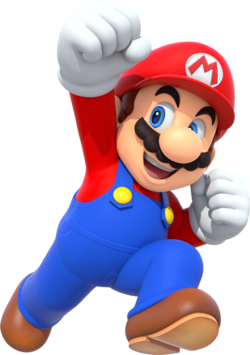 
Official artwork of Mario from Mario Party 10. | |
| Universe | Mario |
| Debut | Donkey Kong (1981) |
| Smash Bros. appearances | SSB Melee Brawl SSB4 Ultimate |
| Most recent non-Smash appearance | Mario Sports Superstars (2017) |
| Console/platform of origin | Arcade |
| Species | Human |
| Gender | Male |
| Place of origin | Mushroom Kingdom |
| Created by | Shigeru Miyamoto |
| Designed by | Shigeru Miyamoto (Donkey Kong) Yoichi Kotabe (Super Mario Bros. series) Shigefumi Hino (Super Mario World) |
| Voice actor | Charles Martinet |
| Article on Super Mario Wiki | Mario |
Mario (マリオ, Mario) is Nintendo's flagship character and is the long-running eponymous hero in the extensive Mario series of video games. Unanimously viewed as the mascot of Nintendo, Mario is said to be the most well-known and most popular video game character in the world, having appeared in over 200 video games. Mario appears as a main playable fighter in all four Super Smash Bros. games and is depicted as a lead character of sorts for the franchise, much like his position within Nintendo itself. Mario was also the rival to Sega's Sonic the Hedgehog in the 1990s. His voice actor in all four Super Smash Bros. games is Charles Martinet, who also voices Luigi, Wario, Waluigi, and Toadsworth, all of whom are other characters from his series.
Character description
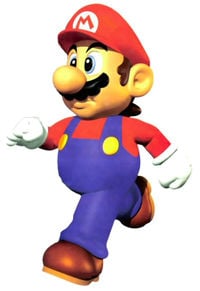
Years before video gaming exploded into mainstream popularity, prominent game designer Shigeru Miyamoto designed the original arcade game Donkey Kong in 1981, debuting Mario as the main playable character and Donkey Kong as his in-game nemesis. Mario's character design was heavily influenced by the extreme technical limitations of digital games at the time; as a small batch of pixels, Mario was given a mustache under his big nose to show he had a face, and suspenders with his shirt to show a distinction between his arms and body. In this game Mario was originally known as "Jumpman" in the initial Japanese release, and he was portrayed as a carpenter whose girlfriend Pauline (originally "Lady" in Japan) was held captive by the colossal ape Donkey Kong, and must jump his way over the barrels and flames DK throws at him to rescue Pauline.
After his initial appearance in this pioneering game, Mario, under his proper name for the first time in Japan, was introduced in the sequel, Donkey Kong Junior, and identified as of Italian ethnicity by Nintendo's president Hiroshi Yamauchi. Mario was named as such due to his comical resemblance to Nintendo of America's landlord Mario Segale. Then Mario and his newly introduced brother Luigi starred in the 1983 arcade game Mario Bros. as plumbers.
Miyamoto's next game was the world-famous Super Mario Bros. for the Famicom/NES, the game that single-handedly brought video gaming into the mainstream and made Nintendo a major company in a now-major industry [1]. Many iconic aspects of Mario and his franchise were established: Mario and Luigi now live in the magical Mushroom Kingdom ruled under Princess "Peach" Toadstool and her mushroom-retaining Toad servants, and the Koopa king Bowser kidnaps the princess for Mario to rescue. Mario must bound across side-scrolling platform stages to rescue her, jumping on the heads of common enemies like Goombas and Koopa Troopas to defeat them. He starts out small but can grow to double his size if he grabs a Super Mushroom power-up, gain the ability to shoot out fireballs by grabbing a Fire Flower, and turn invincible for a short period of time by grabbing a Super Star. Super Mario Bros. became a franchise with these elements lasered into video game iconography, consistent in future games in the Mario series.
For over 20 years afterward, Mario would star in many games for various Nintendo systems. Mario and his accompanying franchise can be viewed as Nintendo's thematic tileset with which to create games of a whimsical, colorful, and light-hearted nature. Mario himself is meant to be a character anyone can enjoy playing as, and can fit well as a protagonist figure and/or main balanced character in many genres of games. To this end, he is not portrayed as a character that undergoes development like what players would see with a character in an epic RPG's story. He is, in fact, rarely (but occasionally) depicted speaking coherent English sentences. In contemporary Mario games, Mario's high-pitched Italian voice, provided by Charles Martinet, is used mainly for grunts and yells and the occasional catchphrase, such as "Mama-mia!", "It's-a me, Mario!", "Let's-a-go!", although he is shown to speak at length in some spin-off games and official interviews. As a semi-silent, optimistic protagonist, Mario is inherently easy for players of his various games to appreciate, and he is usually the most balanced selectable character in any game he appears in, including the Smash Bros. games. While Mario's definitive, Martinet-voiced depiction was codified by Super Mario 64, most auxiliary media prior to that game (such as the live-action film and various cartoons) provided different portrayals of the iconic plumber, typically as a mild caricature of a working-class Italian-American with a gruff Brooklyn accent.
Genres of games in which Mario appears in a playable role include the traditional 2D side-scrolling platformer, including various sequels to Super Mario Bros., the famed Super NES launch platformer Super Mario World, which introduced Yoshi as a mount of sorts for Mario, and the DS homage to these games in the form of New Super Mario Bros.; 3D platforming adventures such as the seminal Super Mario 64 adventure game launched for the Nintendo 64, followed up by Super Mario Sunshine for the Nintendo GameCube, Super Mario Galaxy for the Wii and Super Mario 3D World for the Wii U, with all four games being critical successes and Super Mario 64 and Super Mario Galaxy being considered among the greatest and most influential games of all time; the Mario Kart series of power-up and obstacle course-based racing games; a long-running series of multiplayer-based party games named Mario Party; various series of Mario-themed sports titles such as Mario Golf and Mario Tennis; hands-on RPGs such as the Paper Mario and Mario & Luigi series; and a puzzle game named Dr. Mario, where Mario in the garb of a medicine man throws pills into a bottle to combat viruses (his persona in this game is also a playable character in Super Smash Bros. Melee, see Dr. Mario). A baby version of Mario, who is often treated as a separate character, has also appeared in many of these games. Mario made his first appearance in a fighting game in 1999's Super Smash Bros., and has appeared traditionally in all subsequent installments of that series.
In Super Smash Bros.
As a playable character
Mario makes his first appearance in a fighting game in the original Super Smash Bros. as a starting playable character. He is based on his appearance in Super Mario 64. Like in many other games, he is touted as the most balanced character with no real strengths or weaknesses; therefore, new players of the game are encouraged to play as him first. In the competitive meta-game, he can combo well but lacks a multipurpose finisher. His lack of outstanding strengths make him only a high-tier fighter, placing him at 7th in B tier on the SSB tier list. His neutral special move shoots a moderately fast, bouncing, low-damage Fireball in the direction he is facing; his up special move is an uppercut third-jump called the Super Jump Punch which can hit multiple times for minor damage (and coins briefly appear with each hit); and his down special move is the Mario Tornado, where he whirls his body to damage foes around him, before throwing them up into the air.
Mario's in-game character description reads as follows:
- Mario
- Although best known as the mustachioed plumber who battles the Turtle Tribe with his distinct jumping action, this internationally-famous hero has also acted as a referee, a driver, and even a doctor! He's been linked to Princess Peach of Mushroom Kingdom for years, but to this day their true relationship remains a mystery.
- Works:
- Super Mario Bros. (NES),
- Super Mario Kart (SNES),
- Mario Kart 64 (Nintendo 64)
In Super Smash Bros. Melee
As a playable character
As a starting playable character in this game, Mario is touted as the most balanced character of the game's character roster, much like his appearances in other games, with no real strengths but no outstanding weaknesses either; therefore, new players of the game are encouraged to play as him first. His appearance is still based on his appearance in Super Mario 64 like in the previous game. His new side special move is whipping out his yellow Cape from Super Mario World to turn the enemy in front of him facing the opposite direction, which is useful for diverting enemy attack and recovery. In the competitive meta-game, he can easily combo opponents, has a long wavedash like Luigi, and is good at juggling opponents, but it is his lack of a reliable finisher that causes him to remain in the game's Middle Tier; his Smash attacks do not even feature all that much knockback and range, impairing his ability to fight like a character like Marth. He also has low grab range and bad recovery. It is notable that in both versions, Mario has great combo potential coupled with the lack of a good finisher.
Trophies
In addition to the standard three trophies which playable characters in Melee get - a standard trophy won by defeating Classic Mode, and "Smash Red" and "Smash Blue" trophies won by beating the Adventure and All-Star modes, respectively - Mario, as Nintendo's mascot, also features on a number of other trophies as Dr. Mario (see Dr. Mario (SSBM)), Raccoon Mario, Metal Mario, Paper Mario, and Mario and Yoshi. The last trophy in particular is especially notable for being one of two "gift trophies" never found during normal play, only available at all in the NTSC version of Melee, and then only at special Japanese events or by using a hacking device. There is also a trophy for Baby Mario, a baby version of Mario that mostly appears in Yoshi games.
Mario's Classic Mode trophy, and his Baby Mario trophy, read as follows:
Mario
Known worldwide as Mr. Nintendo, Mario uses his incredible jumping ability to thwart the evil Bowser time after time. While he's best known as a hero, Mario has played many roles, including racer, doctor, golfer, and villain. His tastes have changed over 20 years of gaming; he long ago swapped the colors of his shirt and overalls.
- Donkey Kong, Arcade 1981
Baby Mario
Long ago, when the stork was carrying Baby Mario and Baby Luigi to the Mario household, the stork was ambushed, causing Baby Mario to tumble onto Yoshi's Island. This marked the beginning of the Yoshi's adventure to deliver Baby Mario to his parents. Since then, Baby Mario's been spotted on golf courses and tennis courts.
- Super Mario World 2: Yoshi's Island (10/95)(SNES)
In Super Smash Bros. Brawl
As a playable character
Mario was again a playable character in Super Smash Bros. Brawl, ostensibly intended to be the most balanced character. His appearance is based on his appearance in contemporary Mario games, such as Luigi's Mansion and Super Mario Sunshine. He has undergone a visual redesign, like his Fireball, which looks more realistic, but he is essentially the same fighter as he appeared in Melee, retaining all of his moves (although his former down special attack, the Mario Tornado, has become his down aerial attack, its former slot taken by F.L.U.D.D.). Like all of the game's other returning characters, he incorporates a Final Smash attack which can be used once he collects a Smash Ball. His Final Smash is the Mario Finale, where he projects a colossal, intertwining fireball to engulf all opponents in his direction. The Mario Finale extends to both well above and well below Mario's position, so Smash Bros. DOJO!! recommends that he is standing on a moderately elevated platform for maximum effect.
Mario is ranked 31st on the current tier list in F tier. While his tournament results have been surprisingly high, his rather standard abilities are outshined by the abilities of many other characters.
Trophies
Mario has a trophy that is awarded each time Classic mode is completed with him on any difficulty. The player can get a Mario Finale Trophy each time the player completes All-Star mode with Mario. See Mario Finale for the trophy description of Mario's Final Smash.
Mario
A familiar overall-clad figure who is Nintendo's flagship character. His courage and jumping ability have seen him through countless adventures. He's a multi-talented plumber with the knowledge of a physician, a top-notch golfer, and a veteran tennis umpire. Is his jumping prowess a boon from his girder-climbing days?
Baby Mario
Mario as a baby...a crybaby at that. Even then he wore overalls, and we can see the trademark red hat at this young age.[1] Everyone's favorite hero was riding Yoshi and adventuring from his youngest days, and even as a baby it's clear that Mario had quite the nose.
Paper Mario
A legendary hero whose adventure unfolds when he sets out to rescue Princess Peach from the nefarious clutches of Count Bleck. He has the ability to flip the world from 2-D to 3-D and back again. If he grabs a Mega Star, he'll transform into a pixelated giant Mario. In this state, he's invulnerable and capable of stomping through enemies and obstacles with ease.
Stickers
| Name | Game | Effect | Characters |
|---|---|---|---|
| Baby Mario | Super Mario World 2: Yoshi's Island | ||
| Bubble Baby Mario | Yoshi's Island | ||
| Mario & Luigi | Mario & Luigi: Superstar Saga | ||
| Mario & Yoshi | Super Mario Sunshine | ||
| Mario | Mario Kart DS | ||
| Mario | Super Mario Baseball | Carry Home-Run Bat | |
| Mario | Super Paper Mario | ||
| Raccoon Mario | Super Mario Bros. 3 |
 Baby Mario (Yoshi's Island) |
 Bubble Baby Mario (Yoshi's Island) |
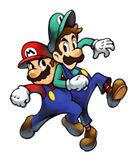 Mario & Luigi (Mario & Luigi: SS) |
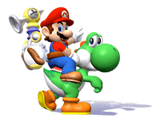 Mario & Yoshi (Super Mario Sunshine) |
 Mario (Mario Kart DS) |
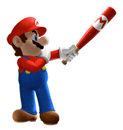 Mario (Mario Superstar Baseball) |
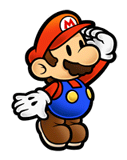 Mario (Super Paper Mario) |
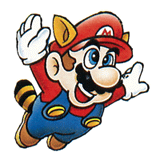 Raccoon Mario (Super Mario Bros. 3) |
In Super Smash Bros. 4
Mario was confirmed as a playable character during the E3 2013 Nintendo Direct. His appearance is based on his appearance in recent Mario games, such as Super Mario 3D World and Mario Kart 8.
Mario was buffed significantly from Brawl to Smash 4, resulting in a high tier list placement, ranking 6th out of 58 characters, placing him within A tier. He received buffs to his speed, power and reach. His comboing game, while not as powerful as other characters like Luigi and Sheik, is still very solid, with the most notable example being down throw following up into multiple up tilts. His fast attacks give him a surprisingly threatening neutral game as well, as the generally low cooldown in his moves does not leave him too open to getting punished himself. His Cape and F.L.U.D.D. specials also grant him commendable edge-guarding capabilities. Nonetheless, Mario's weaknesses include some trouble dealing with characters with disjointed reach due to his own average range, and a subpar recovery. Overall, Mario's little weaknesses, as well as his all-rounded and easy-to-play status, has allowed him be to very successful in tournament play, earning strong representation and results.
Trophies
Mario
As iconic as iconic gets, this gaming celebrity is known for saving the world from Bowser. He's got amazing jumping skills and makes use of a wide range of transformations. In his free time, he plays too many sports to count. In Smash Bros., he's a well-rounded fighter you can rely on. Say it with me: "It's-a me, Mario!"
It's-a him! Maaario! Whether he's wearing one of his special outfits or just his normal blue dungarees, this running, jumping, Bowser-bashing, princess-saving hero is an all-round superstar. And in this game, he's got enough tricks up his sleeve to deal with anything. If you don't know which fighter to pick, Mario's a solid choice.
- Appears In
: Donkey Kong Classics 09/1988
: Super Mario Bros. 10/1985
Mario (Alt.)
Super Jump Punch is an up-special move that lets you leap high into the air, carrying any fighters you strike along with you. You'll be invincible for a moment after you launch this attack. The default side-special move, Cape, will flip a fighter around. Keep a foe from returning with this move!
Mario's Super Jump Punch takes you high into the air, and if you catch an opponent with it, they'll go up with you. Try to hit them at the very start of the move to do the most damage. His default side special, Cape, can flip fighters around. If you're really crafty, you can even use it to keep someone from getting back on the stage!
- Appears In
: Donkey Kong Classics 09/1988
: Super Mario Bros. 10/1985
Mario + Standard Kart
Customizing your ride is part of the fun of Mario Kart 7. Choose the best frame, tires, and glider to make your own dream machine! You can come up with some outlandish combinations, but I think Mario looks best when you keep things simple.
Customising your kart in Mario Kart 7 is a lot of fun. Pick your favourite frame, tyres and glider, and make your mark out on the track! Maybe your favourites are the basic ones. Nothing wrong with that! Flashy is all well and good, but there's something to be said for "simple-but-effective".
Mario + Standard Bike
- In Mario Kart Wii, bikes were the big, new thing. This Standard Bike M is, as you'd expect, a very standard bike--its speed, weight, acceleration, handling, off-road, drift, and mini-turbo stats are all decidedly middle of the road. This makes it a great choice for Mario Kart beginners or for series veterans trying out bikes for the first time.
: Mario Kart Wii 04/2008
Tanooki Mario & Kitsune Luigi
If you find a Super Leaf, Mario transforms into Tanooki Mario! His newfound tail works as a weapon and as a propeller to slow his fall. His brother, Luigi, won't turn into a Tanooki, though—he becomes Kitsune Luigi. Wouldn't want to have trouble telling the two apart, would we?
When Mario uses a Super Leaf, he grows a tail and turns into Tanooki Mario, a very handy form indeed. Likewise, Luigi turns into Kitsune Luigi. Both of them can swing their tails to attack enemies, or wag their tails to slowly float down after a jump, almost like they're walking on air.
Statue Mario
Statue Mario is invincible and will be ignored by his enemies. If he transforms in midair, he'll do a nice Thwomp impression but he can't move! Well, unless a moving platform carries him into unlucky enemies. Give it a try in Super Mario 3D Land!
Statue Mario's not just invincible - he's invisible to enemies. If Mario turns into Statue Mario in mid-air, he'll slam down and be stuck to the spot. Moving platforms will still carry him, though, and he'll knock down anyone in his way. Try it next time you play Super Mario 3D Land!
Boomerang Mario
If you know how the Boomerang Bros. like to fight, they really aren't that tough. But if Mario BECOMES a Boomerang Bro—Boomerang Mario—what then? Will his opponents be stunned by his new moves? At the least, throwing a boomerang makes things more fun!
"Before you judge someone, walk a mile in their shoes." Mario's taken that to the next level with the Boomerang Bros. - he's put on the whole outfit! As Boomerang Mario, he'll not just have more attack power - he'll have a big dollop of fun flinging that boomerang around. Great times!
Mario (With Propeller Box)
Mario with his head in a Propeller Box. He looks like something you'd see in a parade. But wait! That propeller isn't just for show—Mario can use it in the middle of a jump to go even higher. And it'll slow his fall back to the ground too!
It's Mario, but with a Propeller Box on his head. It looks like some kind of weird parade costume... Unlike a parade costume, though, the propeller isn't just for show - Mario can use it mid-jump to send himself soaring into the air, and then float gently back down to the ground afterwards!
Mario (Gold Block)
Mario (With Gold Block)
Oh no! Has the karma for smashing all those blocks finally caught up with Mario, and now he's doomed to wear a block on his head forever? Not at all! This Gold Block gives Mario coins whenever he runs and jumps. Cha-ching! Everyone loves getting more coins!
Uh-oh! is this payback for all the blocks Mario's smashed over the years?! Oh, wait. It's actually an awesome bonus! With the Gold Block on his head, running and jumping make that familiar sound: Da-ding! Da-ding! Da-di-di-di-di-ding! That's right - you get coins! Coins galore!
Mario Golf: World Tour
Looks like Mario is really on his game today! Or he just sent his ball off the course and into the trees—it's hard to tell. Getting a ball out of the rough is part of golf! It adds a bit of adventure to the game, though the undersea course in this world tour probably adds more.
Mario looks like he's having a good game here! Or maybe he's just whacked his ball out of sight and into the trees. It's anyone's guess, really. Well getting a ball out of the rough can still be fun. Things like that give the game a touch of adventure, which is something world tour is just full of - especially the underwater course!
Bee Mario
Do you hear that buzzing? Whatever could it...bee? Bee Mario! Finding a Bee Mushroom allows Mario to buzz around in the air, land on flowers, and stick to walls covered in honey. Oh, this is the bee's knees! However, Bee Mario can't sting his foes. But that's fine--you don't really want to be that kind of bee, do you?
If you don't want to be Mario any more, be Bee Mario instead! Just find a Bee Mushroom, and you can buzz around in the air, land on flowers and stick to walls covered in honey. See? It'll be the bee's knees! The only bee thing you won't be doing is stinging. But that's not the kind of bee you want to be anyway, now is it?
: Super Mario Galaxy 11/2007
: Super Mario Galaxy 2 05/2010
Boo Mario
Are you afraid of ghosts? Maybe it will help to see the world as they do. Become Boo Mario with a Boo Mushroom, and then explore their world! Shake your Wii Remote to make Boo Mario go through walls. Boo Mario blends in OK, but even as a ghost he keeps his trademark hat. The other Boos don't seem to mind, thankfully.
Boos are always tricky to deal with, so if you can't beat 'em, join 'em! All you need to do is grab a Boo Mushroom, and you'll become a Boo, letting you turn invisible, slip straight through walls and even speak Booish! You'd think Boos wouldn't fall for it, what with that trademark cap still firmly on top of your head...but luckily, they do.
: Super Mario Galaxy 11/2007
: Super Mario Galaxy 2 05/2010
Spring Mario
Boingee boingee boingee... It's Spring Mario, bouncing along and having a grand time! Just get a Spring Mushroom, and then press the A Button right when you land for a super-high jump! If you have a fear of heights, though, there's nothing wrong with staying in place and just bouncing a little.
Boing! Sproing! Mario's turned into a spring! One touch of a Spring Mushroom and he becomes Spring Mario. He'll bounce SUPER high if you press the A Button right when he lands. Doesn't it make you feel like just bouncing on the spot? Boing, boing, boing...
: Super Mario Galaxy 11/2007
: Super Mario Galaxy 2 05/2010
Rainbow Mario
What would you get if you combined Mario with a bouncing, rainbow-colored star? An amazing, invincible Rainbow Mario, of course! Plus, Mario will glow with twinkling stars and have and an energetic song play for the duration. Doesn't that make you want to run out and grab a Rainbow Star right now?
What would you do if you found a star that glowed in seven colours? "Grab it quick"? Well, that would be the smart thing to do, because it'd probably be a Rainbow Star! It turns everyone's favourite moustachioed man into a...well, a rainbow-coloured mouastachioed man. Not only does he become invincible, but he looks fab!
: Super Mario Galaxy 11/2007
: Super Mario Galaxy 2 05/2010
Propeller Mario
You can tell just by the sound that there's something different about the propeller on Mario's head. It must be because it's made of rubber! In any case, Propeller Mushrooms transform Mario into Propeller Mario. Shake the Wii Remote to send Mario zooming up into the air!
The propeller on Propeller Mario's head makes such an awesome sound. Not like an engine or a motor - it's more like it's powered by an elastic band. Grabbing a Propeller Mushroom turns Mario into this form, letting you send him whirling waaaaay up into the air, making that awesome sound as he goes!
: New Super Mario Bros. Wii 11/2009
: New Super Mario Bros. U 11/2012
Penguin Mario
Ahh, the life of a penguin... So carefree. At last, Mario too can enjoy the feeling of gliding across the ice by donning the Penguin Suit. Not only that, but this suit unlocks other penguin abilities too! Mario can swim gracefully and, just like a penguin, dream of a day when he can fly.
What sort of penguin-y activities do you think Mario can get up to while wearing a Penguin Suit? Sliding around on his belly? Swimming gracefully through water? Tragically looking to the skies, reflecting on unfulfilled dreams of using his penguin wings to fly? Well, the truth is...he can do all of these things, just like a real penguin!
: New Super Mario Bros. Wii 11/2009
: New Super Mario Bros. U 11/2012
Cloud Mario
- Guess what happens when Mario collects a Cloud Flower! Oh, wait. You can already see exactly what happens... That's right, Mario dons a fluffy hat, overalls, and a scarf and gets a whole lot lighter. He can jump farther, stay in the air longer, walk on clouds, and even make cloud platforms. This outfit is all silver lining!
: Super Mario Galaxy 2 05/2010
Rock Mario
- If you're a fan of rock and roll, try picking up a Rock Mushroom. When Mario's transformed into Rock Mario, a simple shake of the Wii Remote can turn him into a big, rolling boulder, allowing him to plow through crystals and tough foes. The most amazing thing about Rock Mario, though, is that he can still jump.
: Super Mario Galaxy 2 05/2010
Flying Squirrel Mario
When Mario grabs a Super Acorn, he turns into Flying Squirrel Mario! Like a real flying squirrel, he can hold out his arms and glide through the air. That must feel really, really awesome! This power isn't just for fun, though—it has practical uses, too, like helping him grab the coins in midair. Da-ding! Da-ding! Da-ding!
When Mario grabs a Super Acorn, he turns into Flying Squirrel Mario! Like a real flying squirrel, he can hold out his arms and glide through the air, which probably feels really awesome. This power isn't just for fun, though — it has practical uses, too, like helping him grab coins floating in mid-air. Da-ding! Da-ding! Da-ding! Da-ding!
: New Super Mario Bros. U 11/2012
Baby Mario
A baby version of Mario, sans mustache, who first appeared in Yoshi's Island. Still in diapers, he mostly leaves the adventuring to Yoshi unless a Super Star is involved. If that happens, he becomes invincible and runs around with a cape— a little smooth-faced Super Mario!
A baby version of Mario (sans moustache) who first appeared in Yoshi's Island. Since he's still in nappies, it's up to Yoshi to keep him safe. Give him a Super Star, though, and he'll turn invincible, just like grown-up Mario! If only it gave him a moustache too... That would be awesome.
Paper Mario
The paper-thin Mario from the Paper Mario series recently quested for the wish-granting Royal Stickers. These magic stickers are for more than just collecting, though. Mario can use them to change his paper world, and nothing helps him in battle more than a sticker!
A paper-thin version of Mario from the Paper Mario series.. Most recently, he set off on a sticker-packed adventure to find the wish-granting Royal Stickers. Stickers aren't just for collecting, though - they're for making bridges, opening ancient doors, and even for taking on foes in battle!
- MarioAllStarTrophy3DS.png
Alt. (3DS)
- MarioAllStarTrophyWiiU.png
Alt. (Wii U)
Trivia
- Despite being a character primarily known for his jumping abilities outside Super Smash Bros., Mario has had below average jumping abilities in the first three Smash Bros. games.
- Despite being able to crawl outside Super Smash Bros., Mario cannot crawl in any Smash Bros. game to date.
- Mario has officially appeared alongside all other third-party characters in Super Smash Bros. except Cloud and Ryu, and in crossovers with all third-party franchises represented in the Super Smash Bros. series:
- He appeared with Pac-Man in the Mario Kart Arcade series and provided commentary in Pac-Man Vs..
- He appeared with Sonic in the Mario & Sonic games.
- He appeared with Mega Man in the Super Mario: Die Bescherung comic.
- He appeared with various Street Fighter characters in a German Club Nintendo comic.
- He appeared with various Final Fantasy characters representing generic classes and creatures in Mario Hoops 3-on-3 and Mario Sports Mix.
- He made a cameo appearance in the form of a figurine on Otacon's desk in Metal Gear Solid: The Twin Snakes, which featured Solid Snake as a main character, although his only Smash Bros. appearance was in Brawl.
- He made a cameo as a plush doll attached to the Princess Peach costume in Bayonetta 2 and the Wii U port of the original Bayonetta.
- Mario and Marth are the only characters to have two different characters as full clones, Mario's being Luigi in Super Smash Bros. and Dr. Mario in Melee and Smash 4.
- Mario has been one of the first characters, if not the first character, to be confirmed as a playable character for each game from Melee onward.
Notes
- ^ The NTSC version of the Baby Mario trophy claimed that "he lacks overalls", even though the trophy itself depicts him with his trademark red/blue overalls. This was corrected for the PAL release of Brawl. [The full second sentence of the NTSC version read: "Although he lacks overalls, we can see the trademark red hat even at this young age."]
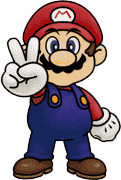
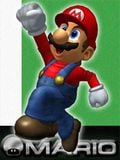
![Mario [Classic Mode] trophy](https://ssb.wiki.gallery/images/thumb/3/32/Mario_Trophy_Melee.png/77px-Mario_Trophy_Melee.png)
![Mario [Smash, Adventure Mode] trophy](https://ssb.wiki.gallery/images/thumb/c/c3/Mario_Trophy_%28Smash%29.png/82px-Mario_Trophy_%28Smash%29.png)
![Mario [Smash, All-Star Mode] trophy](https://ssb.wiki.gallery/images/thumb/7/75/Mario_Trophy_%28Smash_2%29.png/93px-Mario_Trophy_%28Smash_2%29.png)





